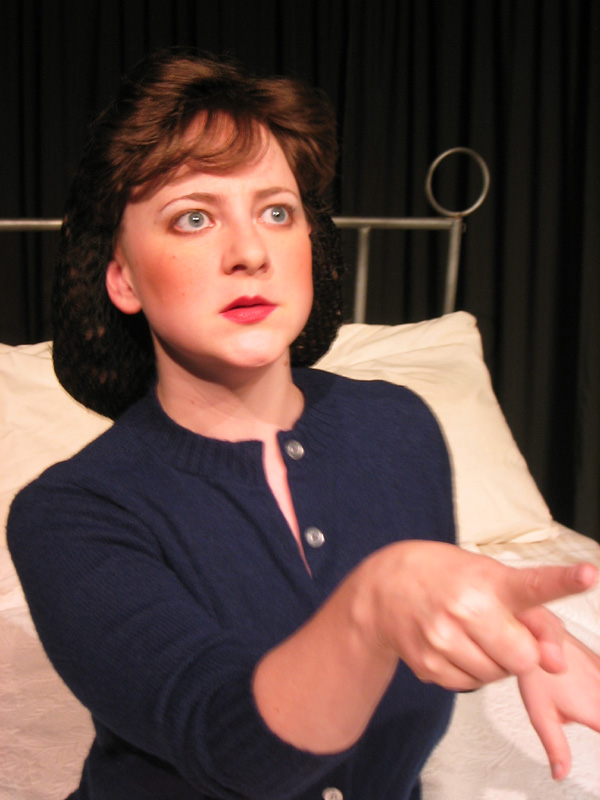Adjectives that would seem like useless hyperbole anywhere else often find their legitimate homes when referencing Buntport Theater’s work. The young collective presenting original works on Denver’s Westside really is uniquely talented, madcap with energy and originality, and, as some have said, “genius.”
But nobody’s perfect.
Buntport’s latest excursion is the old-school “2 in 1.” It’s a throwback on multiple levels, but mainly because Buntport performed the two original one-acts in 2001.
Remounts are good business when you’re Buntport and always attracting new audiences to your mainstage productions and the excellent, biweekly “Magnets on the Fridge,” which closed for the season last week. It gives newbies a chance to see the work that made the company what it is today.
But Buntport has moved forward and, dare I say it, matured a lot in the three years since these were first produced. The interim has seen multiple self-written and -directed full-length plays, one-acts, “Magnets” episodes and at least one musical for this company, one of the busiest in town. So reaching back into their short history has to come at a sacrifice.
Act one is “… and this is my significant bother,” the Buntporters adaptation of some of James Thurber’s short stories. They attempt to explore the American humorist’s literary world, which is full of insight into both relational psychosis and the mind of the individual Everyman in mid-20th century America. Although the series of stories operates partly on Buntport constants (including an excellent multipurpose set and the use of different storytelling voices), it doesn’t always hit.
The theater company is obsessed with style and period and varying their stories’ approaches whenever they can, so this – subtle scenes involving couples in bed, kneeling in front of a running car, or amid awkward conversations about loving and longing – is Buntport’s tribute to the America of “New Yorker” cartoons in the ’30s and ’40s.
And it’s fair to say that this style doesn’t work as well for Buntport (and its core audience) as, say, the detective aesthetic of the ’40s – the setting of their tight, seriocomic “McGuinn and Murry” – or the Elizabethan era that was home to its spoof on Shakespeare, “Titus Andronicus: The Musical!”
They hit most clearly in one short where Brian Colonna’s aloof husband tells Hannah Duggan’s hard nosed wife of his plans to kill her and marry his stenographer. “No, I’m not going to bed,” he quips toward the end. “I’m going to bury you in the cellar.” It’s the least subtle of the pieces, but it’s also the one that clicks on levels that venture beyond the players psychoanalyzing simple-minded, nostalgic, Rockwellian images.
They get closer to comfort with act two, “Word-Horde: A Dramatization of the Study Guide to Beowulf,” which could be called “Compleat Text of Beowulf (Abridged).”
With the help of an ominous, omniscient voiceover acting as the voice of reason, the four Buntporters (Colonna, Duggan, Erik Edborg and Erin Rollman dressed in black and yellow mechanics scrubs, an homage to Cliffs Notes) act as the Everyman student circa 2004, mumbling obscenities and frustrations underneath faux-sneezes as they work their way through the text line by line … almost.
Like “Titus,” “Beowulf” lends itself to the self-deprecating, fast-talking production style. It’s olde, wild and weird, and the Buntport players – whose outlandish writing is more concise and pointed here than in the first act – seize every opportunity to poke fun at the book and themselves.
They perform against the backdrop of an enlarged version of the aged text. Props and costumes made of paper, handily attached to their tool belts, help move the story forward. And the audience gets a treat – we’ll call it Buntport spectacle – when it comes to the dragon at the end of the story.
The two shorts work better as a pair than they would work alone. The night gets off to a slow start. But it builds with Buntport’s incredible attention to detail, such as Duggan’s tuning the car radio in the first act, a pantomime timed perfectly with the audio. And it closes with a laugher.
Not genius, especially when held up to their previous work. But still not a bad night of theater.
-Ricardo Baca, April 30, 2004, Denver Post
